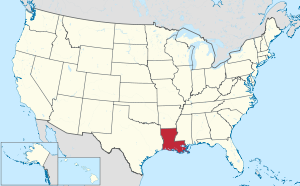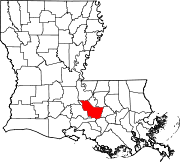Iberville Parish, Louisiana
Iberville Parish | |
|---|---|
Parish | |
| Parish of Iberville | |
 Iberville Parish Courthouse building, originally the Courthouse, then the Plaquemine City Hall, now used as the Iberville Museum | |
 Location within the U.S. state of Louisiana | |
 Louisiana's location within the U.S. | |
| Coordinates: 30°16′N 91°21′W / 30.26°N 91.35°W | |
| Country | |
| State | |
| Founded | 1807 |
| Named for | Pierre Le Moyne d'Iberville |
| Seat | Plaquemine |
| Largest city | St. Gabriel |
| Area | |
| • Total | 653 sq mi (1,690 km2) |
| • Land | 619 sq mi (1,600 km2) |
| • Water | 34 sq mi (90 km2) 5.2% |
| Population (2020) | |
| • Total | 30,241 |
| • Density | 46/sq mi (18/km2) |
| Time zone | UTC−6 (Central) |
| • Summer (DST) | UTC−5 (CDT) |
| Congressional districts | 2nd, 6th |
| Website | www |
Iberville Parish (French: Paroisse d'Iberville) is a parish located south of Baton Rouge in the U.S. state of Louisiana, formed in 1807.[1] The parish seat is Plaquemine.[2] At the 2010 U.S. census, the population was 33,387,[3] and 30,241 at the 2020 census.[4]
History[]
The parish is named for Pierre Le Moyne d'Iberville, who founded the French colony of Louisiana.[5]
A few archeological efforts have been made in the Parish, mainly to excavate the Native American burial mounds that have been identified there. The first expedition, led by Clarence B. Moore, was an attempt at collecting data from a couple of the sites, and it set the groundwork for later projects. Moore was mainly interested in the skeletal remains of the previous inhabitants, rather than excavating for archeological items. Archeologists are especially interested in these sites because of their uniformity and size. Some of the mounds are seven hundred feet long, a hundred feet wide and six feet tall. Most of them contain human remains.[6]
Iberville Parish is represented in the Louisiana State Senate by a Republican, attorney Rick Ward III, a former member of the Louisiana House of Representatives, who has served in the Senate since 2012. The parish is currently represented in the state House by Democrat Major Thibaut of Oscar in Pointe Coupee Parish.
Geography[]
According to the U.S. Census Bureau, the parish has a total area of 653 square miles (1,690 km2), of which 619 square miles (1,600 km2) is land and 34 square miles (88 km2) (5.2%) is water.[7] Iberville Parish is part of the Baton Rouge metropolitan statistical area.
Major highways[]
 Interstate Highway 10
Interstate Highway 10 Louisiana Highway 1
Louisiana Highway 1 Louisiana Highway 30
Louisiana Highway 30 Louisiana Highway 69
Louisiana Highway 69 Louisiana Highway 75
Louisiana Highway 75 Louisiana Highway 76
Louisiana Highway 76 Louisiana Highway 77
Louisiana Highway 77
Adjacent parishes[]
- Pointe Coupee Parish (northwest)
- West Baton Rouge Parish (north)
- East Baton Rouge Parish (northeast)
- Ascension Parish (east)
- Assumption Parish (southeast)
- Iberia Parish (south)
- St. Martin Parish (west)
National protected area[]
Communities[]

Cities[]
- Plaquemine (parish seat)
- St. Gabriel (largest municipality)
Towns[]
Villages[]
- Grosse Tete
- Rosedale
Unincorporated areas[]
Census-designated places[]
- Bayou Goula
- Crescent
- Dorseyville or Dorcyville (home of St John Baptist Church - National Register of Historic Places)
Other unincorporated communities[]
- Alhambra
- Bayou Pigeon
- Bayou Sorrel
- (home of Schexnayder House - National Register of Historic Places)
- (on January 28, 1863, during Civil War, was the site of a Union-Confederate military skirmish)
Demographics[]
| Historical population | |||
|---|---|---|---|
| Census | Pop. | %± | |
| 1820 | 4,414 | — | |
| 1830 | 7,049 | 59.7% | |
| 1840 | 8,495 | 20.5% | |
| 1850 | 12,278 | 44.5% | |
| 1860 | 14,661 | 19.4% | |
| 1870 | 12,347 | −15.8% | |
| 1880 | 17,544 | 42.1% | |
| 1890 | 21,848 | 24.5% | |
| 1900 | 27,006 | 23.6% | |
| 1910 | 30,954 | 14.6% | |
| 1920 | 26,806 | −13.4% | |
| 1930 | 24,638 | −8.1% | |
| 1940 | 27,721 | 12.5% | |
| 1950 | 26,750 | −3.5% | |
| 1960 | 29,939 | 11.9% | |
| 1970 | 30,746 | 2.7% | |
| 1980 | 32,159 | 4.6% | |
| 1990 | 31,049 | −3.5% | |
| 2000 | 33,320 | 7.3% | |
| 2010 | 33,387 | 0.2% | |
| 2020 | 30,241 | −9.4% | |
| U.S. Decennial Census[8] 1790-1960[9] 1900-1990[10] 1990-2000[11] 2010-2013[3] | |||
The 2019 census-estimates determined 32,822 people lived in the parish,[12] down from 33,387 at the 2010 United States census, and up from 33,320 at the 2000 U.S. census.[13] At the 2020 census, there were 30,241 people in the parish.[4]
The racial and ethnic makeup of the parish was 48.2% Black and African American, 49.6% non-Hispanic white, 0.1% American Indian and Alaska Native, 0.5% some other race, and 1.5% two or more races. Approximately 2.6% of the population were Hispanic and Latin American of any race.
In 2010, its racial and ethnic makeup was 49.3% Black and African American, 48.8% non-Hispanic white, 0.3% Asian, 0.2% American Indian and Alaska Native, 0.6% some other race, and 0.8% from two or more races; 2.0% were Hispanic and Latin American of any race. At the 2000 census. 49.26% were non-Hispanic white, 49.7% African American, 0.18% American Indian and Alaska Native, 0.26% Asian, 0.01% Native Hawaiian and other Pacific Islander, 0.14% from other races, and 0.45% from two or more races; 1.03% were Hispanic and Latin American of any race.
There were 10,903 households at the 2019 census-estimates, and 13,396 housing units. Of the 2,697 businesses operating in the parish, 1,339 were minority-owned. The parish had an employment rate of 47.9%.[12] There was a home-ownership rate of 73.4%, and the median housing value was $143,700; the median gross rent was $755.
The median income for a household was $50,161; males had a median income of $54,655 versus $30,773 for females; 27.6% of the population lived at or below the poverty line.
Government and infrastructure[]
The Louisiana Department of Public Safety and Corrections operates two prisons, Elayn Hunt Correctional Center and Louisiana Correctional Institute for Women (LCIW), in St. Gabriel in Iberville Parish.[14][15] LCIW houses the female death row.[16][17]
Education[]
Primary and secondary schools[]
Iberville Parish School Board operates the public schools within Iberville Parish.
Public libraries[]
Iberville Parish Library operates libraries in the parish. The Parish Headquarters Library is located in Plaquemine. Branches include Bayou Pigeon (Unincorporated area), Bayou Sorrel (Unincorporated area), East Iberville (St. Gabriel), Grosse Tete (Grosse Tete), Maringouin (Maringouin), Rosedale (Rosedale), White Castle (White Castle).[19]
Colleges and universities[]
It is in the service area of South Louisiana Community College.[20]
National Guard[]
The Gillis W. Long Center, located on the outskirts of Carville, LA, is operated by the Louisiana Army National Guard. This post is home to the 415TH MI (Military Intelligence) Battalion, the 241ST MPAD, and the 61st Troop Command. The 415TH MI is a subunit of the 139TH RSG (regional support group).
See also[]
- National Register of Historic Places listings in Iberville Parish, Louisiana
- Jessel Ourso, sheriff of Iberville Parish from 1964 to 1978; suspended, 1968-1972
- Edward J. Price, state representative for District 58, which includes Iberville Parish
References[]
- ^ "Iberville Parish". Center for Cultural and Eco-Tourism. Retrieved September 6, 2014.
- ^ "Find a County". National Association of Counties. Archived from the original on 2011-05-31. Retrieved 2011-06-07.
- ^ Jump up to: a b "State & County QuickFacts". United States Census Bureau. Archived from the original on June 6, 2011. Retrieved August 9, 2013.
- ^ Jump up to: a b "QuickFacts: Iberville Parish, Louisiana". U.S. Census Bureau.
- ^ Gannett, Henry (1905). The Origin of Certain Place Names in the United States. Govt. Print. Off. p. 164.
- ^ Ford, James A: "Measuring the Flow of Time", page 415. The University of Alabama Press, 1999
- ^ "2010 Census Gazetteer Files". United States Census Bureau. August 22, 2012. Archived from the original on September 28, 2013. Retrieved August 20, 2014.
- ^ "U.S. Decennial Census". United States Census Bureau. Retrieved August 20, 2014.
- ^ "Historical Census Browser". University of Virginia Library. Retrieved August 20, 2014.
- ^ "Population of Counties by Decennial Census: 1900 to 1990". United States Census Bureau. Retrieved August 20, 2014.
- ^ "Census 2000 PHC-T-4. Ranking Tables for Counties: 1990 and 2000" (PDF). United States Census Bureau. Retrieved August 20, 2014.
- ^ Jump up to: a b "Geography Profile: Iberville Parish, Louisiana". data.census.gov. Retrieved 2021-08-04.
- ^ "U.S. Census website". United States Census Bureau. Retrieved 2008-01-31.
- ^ "Elayn Hunt Correctional Center Archived 2010-09-24 at the Wayback Machine." (Profile) Louisiana Department of Public Safety and Corrections. Retrieved 20 July 2010
- ^ "Directions to EHCC Archived 2009-09-16 at the Wayback Machine." Elayn Hunt Correctional Center. Retrieved on July 20, 2010.
- ^ "Louisiana Correctional Institute for Women Archived 2010-09-24 at the Wayback Machine." Louisiana Department of Public Safety & Corrections. 14/40. Retrieved 24 August 2010
- ^ "Classification–Where Inmates Serve Their Time." Inside the System: How Inmates Live and Work[permanent dead link]. Louisiana Department of Public Safety & Corrections. 14/40. Retrieved 30 June 2010
- ^ Leip, David. "Dave Leip's Atlas of U.S. Presidential Elections". uselectionatlas.org. Retrieved 2018-03-09.
- ^ "to the Library Catalog[permanent dead link]." Iberville Parish Library. Retrieved 29 January 2011
- ^ "Our Colleges". Louisiana's Technical and Community Colleges. Retrieved 2021-06-03.
External links[]
- Ibervillle Parish government's website
- Iberville Parish Tourist Commission website
- Explore the History and Culture of Southeastern Louisiana, a National Park Service Discover Our Shared Heritage Travel Itinerary
- Iberville Parish Sheriff's Office
Geology
- Heinrich, P. V., and W. J. Autin, 2000, Baton Rouge 30 x 60 minute geologic quadrangle. Louisiana Geological Survey, Baton Rouge, Louisiana
- Louisiana parishes
- Iberville Parish, Louisiana
- Parishes in Acadiana
- Acadiana
- Baton Rouge metropolitan area
- Louisiana parishes on the Mississippi River
- 1807 establishments in the Territory of Orleans
- Populated places established in 1807

